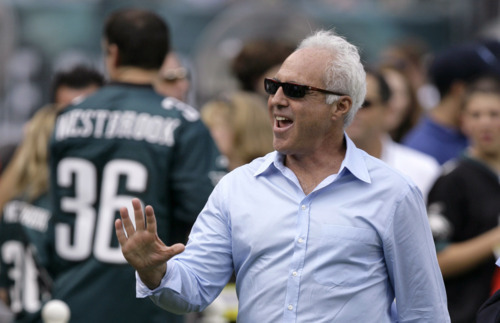
Last week, I wrote about the Eagles front office outsmarting and outflanking the rest of the NFL during free agency. That analysis was only based on a single report detailing how the Eagles set up their offseason plan months in advance.
Now we know, however, that the planning actually began years ago, not just months. That’s the takeaway from New York Times NFL writer Judy Battista, who talked to Banner and Lurie recently:
The structuring, it turns out, began not long after N.F.L. owners decided in the spring of 2008 to opt out of the collective bargaining agreement. The Eagles examined the rules that would be put in place and realized the 2011 free-agency period, if it happened at all, would present an extraordinary buyer’s market.
Because players who would usually have been unrestricted free agents in 2010 were tied up instead, two free-agent classes would be rolled into one, at the same time as teams would again have to work within a salary cap after having none in 2010 — meaning some teams would not be buyers because they were close to the cap number.
So began the meticulous preparation for what finally came to fruition in the last two weeks. In contracts they made late in 2008 and 2009 — including those for Asante Samuel and Jason Peters — the Eagles purposely made the 2011 cap numbers the lowest of the contracts, which is unusual because most contracts have their lowest cap numbers early in the deal.
“You’ll have twice as many players available as usual, and we’re either locked out or there is a reduced cap,” Banner said. “You don’t have to be a brilliant person to figure out there’s going to be huge opportunity. You can’t have increased supply and reduced dollars and not have it. We didn’t know the names, but we did it to take advantage of what was clearly going to be a very team-friendly marketplace. There was a strategic element to this. There was luck as well. Frankly, it turned out better than we hoped.”
No, Joe, you don’t have to to be brilliant. But apparently you have to be smarter and have more foresight than everyone else.
I suppose, if you’re unwilling to trust Banner, you could be skeptical that the Eagles really planned so far in advance. But the Samuel and Peters contracts are intriguing evidence. Check out Eagles Cap if you don’t believe the team structured their contracts this way from the beginning.
After years of mismanagement, the Eagles finally have a front office that’s often a step or more ahead of the rest of the league. Philly fans are naturally predisposed to cynicism, and will probably revolt when this team fails to live up to our expectations in 2011. But at this point, all I can do is shake my head in appreciation. Unfortunately, this group won’t be around forever.
Photo from Getty.